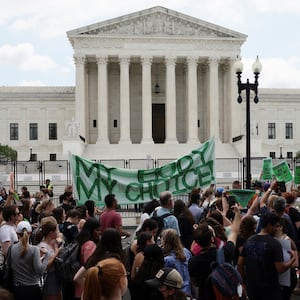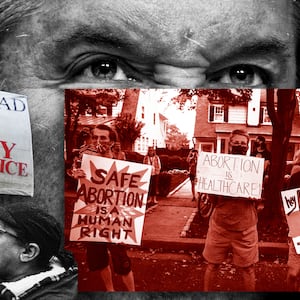Imagine finding yourself in a situation where after talking with your doctor, you have decided to have a safe, common medical procedure—one of the most commonly performed procedures in the United States; safer even than a colonoscopy, which is so safe it is used as a screening test.
Now imagine that you cannot legally obtain that procedure in your state, and any place where you could have the procedure is a several-hour drive or a plane flight away. Your insurance will not cover this medical care. In order to proceed, you will need to: take time off of work; find childcare, transportation, and lodging; and navigate a new state and a different part of the medical system.
Even worse, you could be in legal jeopardy for trying to have this safe, common procedure, the right to which is supported by all major medical associations including the American Medical Association (AMA) and the American Congress of Obstetricians and Gynecologists (ACOG).
Now that the Roe v. Wade decision guaranteeing the right to abortion has been officially overturned by the Supreme Court, this is the reality facing women and all pregnancy-capable people in Missouri, where I practice medicine—and where a "trigger law" immediately banned all abortions "except in cases of medical emergency."
Since medical school I have known that I wanted to provide full-spectrum reproductive health care, which includes abortion care. As an OB/GYN I have taken care of hundreds of patients who have experienced everything from contraceptive failure to rape or incest to a pregnancy complicated by a serious fetal diagnosis. Through referrals from other OB/GYN colleagues I have helped many patients through the devastating experience of ending a much-desired pregnancy due to fetal or maternal medical complications. I trust my patients to make decisions about their health that are best for them, and I do my best to guide them. A question that lies heavy on my mind and keeps me awake at night is—what will my patients do now?
Nearly one in four women will have an abortion in their lifetime. And yet, laws restricting abortion are often created by lawmakers with little to no understanding of the consequences.
These laws come between clinicians and their patients and put restraints on physicians from doing what is best for their patients’ health. They are an assault on bodily autonomy and freedom. When I begin to think about the consequences of this legal decision, a cascade of questions goes through my mind. These are some of the things myself and my colleagues have been asking: What if my patient has a serious medical condition such as pulmonary hypertension, which has a near 50 percent mortality rate in pregnancy, but she is not seriously ill at this moment? Will she be able to obtain an abortion with her OB/GYN? Do we have to wait until she is life-threateningly ill to intervene? What about my patients who need hospital-based procedures due to medical problems? Where can they obtain the care they need?
Some people will have the ability to travel and navigate this new and incredibly unfair system. However, criminalization of abortion disenfranchises vulnerable communities. This has always been true and new restrictions will make this chasm in access even wider. Vulnerable communities include those who are lower income, LGBTQ+, Black, Indigenous, undocumented, disabled, and other people of color. Imagine how difficult obtaining care can be for someone with multiple marginalized identities.
We know from “natural experiments” looking at maternal morbidity and mortality before and after abortion bans in this country (as well as in other countries) that abortion bans do not decrease the number of abortions that occur, but they do increase maternal mortality by about 21 percent.
Although not a panacea, there is one aspect of this current abortion landscape that is less terrifying than in pre-Roe times, in terms of public health consequence—and that is the availability of medication abortion.
Medication abortion can be accessed in a clinic, through telemedicine, or through the mail depending on where you live. Some people will choose to self-manage abortion with pills, which is having a medication abortion outside of the standard health care system. Although research is clear that medication abortion is safe and effective, self-managing medication abortion may be criminalized depending on where you live.
Current scientific evidence overwhelmingly shows that people can safely and effectively self-manage abortions when they have access to accurate information, medication abortion (with a clinician or without), and back-up care in the rare circumstance is it required. In its newest abortion care guidelines, the World Health Organization (WHO) has clearly and unequivocally stated that pregnant people can safely conduct their abortions on their own with pills. However, self-managing abortion may put you at legal risk depending on your location.
Access to abortion pills can help to mitigate some potential harms from overturning Roe v. Wade, but it cannot undo the fact that gutting these legal protections is dismantling people’s basic human rights to health and bodily autonomy. I fear for the health and safety of the members of my community. As an OB/GYN I will continue to care for patients as best as I can, using evidenced-based medicine, and continue to try to decrease barriers to abortion whenever possible.








